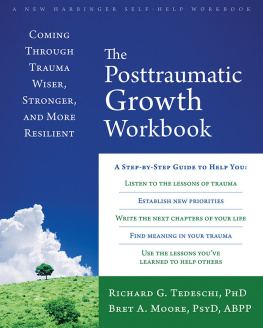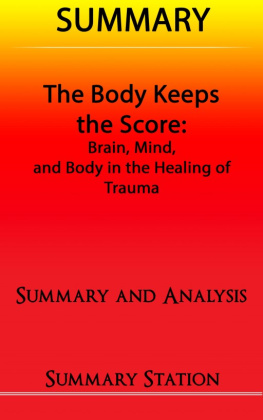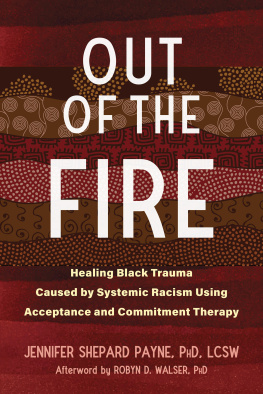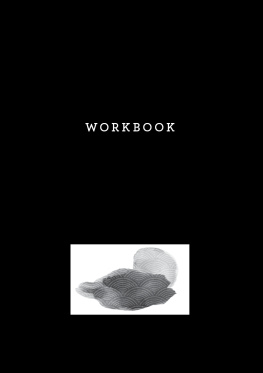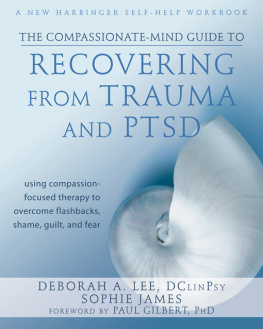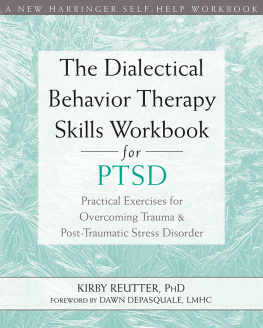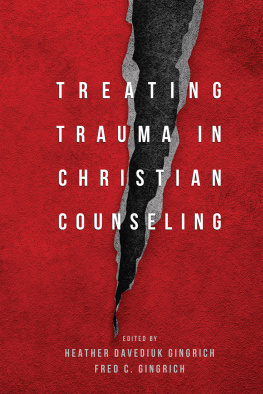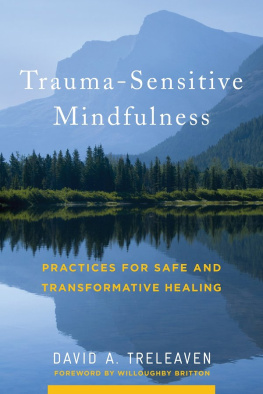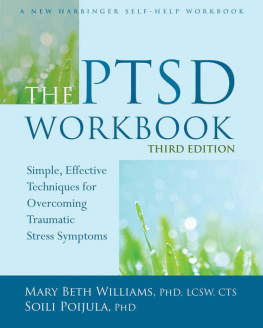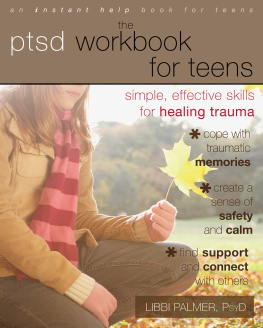Richard Tedeschi and Bret Moores ThePosttraumaticGrowthWorkbook is a gift to people suffering from loss, grief, and trauma. These useful exercises and helpfuland hopefulreadings will not only assist you as you cope with loss, but, more importantly, will help you to continue to grow, despite loss and grief.
Rev. Kenneth J. Doka, PhD, professor at the College of New Rochelle Graduate School, senior consultant for the Hospice Foundation of America, and author of GriefisaJourney
If there were no trauma, there would be no posttraumatic growth. When trauma happens, a new path begins. This path may be full of sorrow and despair, but we are not alone. In spite of trauma, we can grow as people. This book offers the key to unlocking our true potential.
KanakoTaku, certified clinical psychologist in Japan, and associate professor in the psychology department at Oakland University
We see the suffering and results of over fifteen years of war in Iraq and Afghanistan on a daily basis at Boulder Crest Retreat for Military and Veteran Wellness. We also see the amount of strength that exists in military families. If there is one community in our nation that can achieve posttraumatic growth, it is the combat veteran who was forged on the anvil of adversity, and the military family that endured the long and stressful deployments. This workbook is a must for our brothers and sisters who have witnessed the worst that humanity has to offerwar.
KenFalke, retired US Navy Bomb Disposal specialist, philanthropist, and founder of the EOD Warrior Foundation and Boulder Crest Retreat for Military and Veteran Wellness

Publishers Note
This publication is designed to provide accurate and authoritative information in regard to the subject matter covered. It is sold with the understanding that the publisher is not engaged in rendering psychological, financial, legal, or other professional services. If expert assistance or counseling is needed, the services of a competent professional should be sought.
Distributed in Canada by Raincoast Books
Copyright 2016 by Richard G. Tedeschi and Bret A. Moore
New Harbinger Publications, Inc.
5674 Shattuck Avenue
Oakland, CA 94609
www.newharbinger.com
Cover design by Amy Shoup
Acquired by Melissa Kirk
Edited by Brady Kahn
All Rights Reserved
Library of Congress Cataloging-in-Publication Data on file
To Joan, Michael, and Anna Caroline, for all your enthusiasm for life.
RGT
To Lori and Kaitlyn, for your patience, understanding, and unconditional love.
BAM
We would like to dedicate this book to the thousands of men, women, and children whom we have had the pleasure to serve over our collective fifty years of practice. Their experiences, stories, and lives have done much to shape who we are and how we see the world today.
RGT and BAM
Contents
W ithout the support of many people in our lives, this book would not be possible. We would like to thank our families for their encouragement and patience. The trauma survivors to whom we have been companions over the years have been the greatest source of knowledge and inspiration for us. We wish to especially recognize the work on developing the concept of posttraumatic growth, contributed over many years, by Lawrence Calhoun, and the many other colleagues and students who have also played important roles in developing this field. We are indebted to Dr. Matthew Whalley of Psychology Tools for reminding us of the power found within simple techniques. We are grateful for the professionalism and dedication of the publishing staff of New Harbinger, specifically Brady Kahn, who has been masterful in editing this book. And last, we would like to thank Ken Falke, Josh Goldberg, and all the staff of Boulder Crest Retreat. Their mission and dedication inspire and cause us to constantly refine our thinking and apply our ideas in new ways.
A t the time of our writing this book, the American military has taken virtually all of its troops out of Afghanistan and Iraq, which would appear to close a chapter on a traumatic period in American life that began on September 11, 2001. But 9/11 and the ensuing combat were not the only traumas with which the American public became intimately familiar. Also in the news were natural disasters such as Hurricane Katrina and Hurricane Sandy. More difficult to understand is the horror committed by humans. In San Bernardino, California, a radicalized couple killed fourteen innocent people enjoying a holiday party and wounded twenty-one others. And none of us will ever forget the tragic slaughter of twenty first-graders and six adults at Sandy Hook Elementary School in Newtown, Connecticut. However, it doesnt stop there. There are the stories of clergy sexually abusing children. The country endured a major economic recession that dashed the plans of many and put thousands of Americans out of their homes. There is the Ebola epidemic in West Africa. And many individuals have personal traumas that never make the news but are just as emotionally wrenchingbattles with terrible illnesses, unemployment, family disruption, loss, and grief.
Because of the attention paid to trauma in the media, Americans have become increasingly familiar with the problem of post-traumatic stress disorder (PTSD), an often chronic and disabling psychological condition that wreaks havoc on those who suffer from it as well as on their loved ones. Even though PTSD is a response that can be linked to a variety of traumatic experiences, such as rape, car accidents, and natural disasters, most people relate this syndrome to the experience of combat veterans. But anyone who is confronted with an experience that is physically or emotionally threatening can develop PTSD or some symptoms of it.
There are a number of good books already available to help people cope with the symptoms and experience of trauma, recover from trauma, and become stronger. Like other books on trauma recovery, this book is for people who have faced or are continuing to face adversity in their lives and are looking for ways to navigate it successfully. But this book takes trauma survivors beyond simply learning how to cope better. This book is designed for those who wish to go beyond being resilient, to experience meaningful personal growth and perhaps radical transformation in the aftermath of a trauma. We will give you the tools to thrive, grow, and transform yourself. As one trauma survivor told us, Why waste this traumatic experience on just getting back to who I was? Consider the following story.
Joe had wanted to join the Army as far back as he could remember. He got the chance when he turned eighteen, only two weeks after finishing high school. Joe was from a small town in Mississippi and grew up in a lower-middle class family. He was the oldest of four boys, all of whom had visions of escaping their small town existence with the help of the military. Joes mother was a kind and caring woman. A devout Christian, she was heavily involved in the church, which meant Joe and his brothers were as well. His father was a different story. Although not a physically abusive man, Joes dad was prone to angry outbursts that could easily be classified as emotional abuse. These outbursts were most prominent when he was drinking, which happened frequently. His fathers drinking and anger drove a wedge between his father and him at an early age. They fought constantly. Being the oldest, Joe found himself acting as a buffer between his dad and the rest of the family. He despised his dad for putting him in this position. Things came to a head the night before Joe was scheduled to leave for basic training. During a drunken episode, Joes father told him that he was a deserter and a coward for leaving the family. Joes last words to his father were I hate you and hope you die.
Next page
